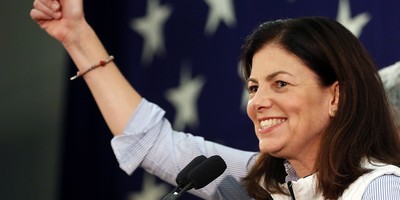WASHINGTON -- President-elect Barack Obama is fixated on the size and cost of the infrastructure spending package he will propose next year, believing that the bigger the price tag, the more effective it will be.
His stimulus plan will be "big," it will be "bold," it will give the economy "a jolt," Obama keeps saying as the package's costs grow ever larger and economists continue to question its validity. Originally, the price tag was about $500 billion over two years, then $700 billion, then $800 billion, and now there is talk among his advisers of $1 trillion or more.
Early in the plan's gestation period, economic policy analyst Cesar Conda did the math and figured out Obama's stimulus plan -- to create or preserve 2.5 million jobs -- would cost taxpayers $280,000 per job.
America did not become the biggest and most successful economy in the world by accepting that kind of irrational, wasteful and unsustainable job cost ratio. "Most of this money won't go directly into people's pockets, but through inefficient government programs and agencies," Conda told me.
Don't expect the nightly news programs to subject Obama's gold-plated economic-stimulus plan to even a cursory analysis or ask the simplest questions about how, or whether, it will work. They seem to be taking his proposals at face value.

I have asked some top economic and fiscal analysts to give me their honest opinion about it, and here's what they told me:
Stanford economist John Cogan: "The federal government tried public-infrastructure spending during the recessions of the 1970s and 1981, and it failed to bring about an economic turnaround.
Recommended
"The superior alternative, among a limited set of options, is permanent across-the-board tax rate reductions on capital and labor. Such reductions take time to work, but experience from the early 1980s and after 2001 shows they will work. Assistance to households facing economic hardship can and should be given. But policies that provide assistance shouldn't be confused with policies that will help turn the economy around," Cogan said.
But what exactly is the theory behind spending stimulus bills? Can the federal government miraculously spend money on public-works jobs and, thus, jumpstart a $14 trillion private economy?
Listen to fiscal policy analyst Brian Riedl of the Heritage Foundation: "Government stimulus bills are based on the idea that Congress can 'inject' new money into the economy, increasing demand and thus production. But where does government get this money? Congress does not have a vault of money waiting to be distributed. Every dollar Congress 'injects' into the economy must first be taxed or borrowed out of the economy," Riedl says.
But every dollar taken out of the economy is one dollar less that the economy has to spend to build businesses, produce goods and services and hire more workers. That means fewer jobs, a lower savings rate, less investment and ultimately a weaker economy. "No new spending power is created. It's merely redistributed from one group of people to another," Riedl says.
Then there is the short-term tax holiday idea being talked up in the corridors of power on Capitol Hill and tax-rebate checks to put money into the hands of ordinary Americans. But that won't work, either.
Why? Businesses and consumers make economic decisions based on long-term policies that they know will not change.
"But if the additional goal is to spur economic growth, this tax 'jolt' will have little impact," said Heritage Foundation economist Stuart Butler in a recent study.
"Short-term tax holidays, or temporary spending jolts, will not rekindle economic growth; only long-term reductions in marginal tax rates on capital and work will accomplish that goal," Butler said.
"Long-term tax-rate reductions -- as opposed to Obama's short-term jolts -- are needed because the important economic decisions that will trigger a real recovery depend on more investment in new factories and new equipment," he argued.
He's right. Investors will risk their capital when they know they can depend on the after-tax return on their investment. This requires long-term tax-rate reductions, "not a temporary shot in the arm" that will be gone in a matter of months, Butler said.
All of this is just basic common sense that seems lost to the Obama team's apparent economic nostalgia for Keynesian New Deal pump-priming that FDR tried in the 1930s without much success. By the end of that decade, unemployment was averaging 17 percent and for all practical purposes we were still in a depression.
America runs on capital and that's the missing ingredient in the president-elect's economic recovery plan. The former neighborhood activist believes that if you spend enough taxpayer money rebuilding roads, bridges and run-down schools and buildings, the temp jobs being created will get the economy going again. But it didn't work in the 1930s, it didn't work in the 1990s in Japan, and it won't work now.
Earlier this year, Republicans briefly had Obama on the defensive over his anti-oil exploration energy policy with the campaign war cry, "Drill, baby, drill."
Trillions of dollars in private capital are locked away in T-bills and other holding accounts that need to be put to work expanding businesses and creating real jobs. Permanently cutting tax rates and eliminating the fed's double-taxation capital-gains rate will unlock this capital.
The GOP's recovery war cry next year should be, "Invest, baby, invest."

























Join the conversation as a VIP Member